If the FBI discovers that foreign hackers have infiltrated the networks of your county election office, you may not find out about it until after voting is over. And your governor and other state officials may be kept in the dark, too.
There's no federal law compelling state and local governments to share information when an electoral system is hacked. And a federal policy keeps details secret by shielding the identity of all cyber victims regardless of whether election systems are involved.
Election officials are in a difficult spot: If someone else's voting system is targeted, they want to know exactly what happened so they can protect their own system. Yet when their own systems are targeted, they may be cautious about disclosing details. They must balance the need for openness with worries over undermining any criminal investigation. And they want to avoid chaos or confusion — the kind of disruption that hackers want.
The secrecy surrounding foreign hacks is not a hypothetical issue. The public still doesn't know which Florida counties were breached by Russian agents in the 2016 election. Rick Scott, Florida's governor in 2016 and now a U.S. senator, was not told at the time and didn't learn most of the details until this year.
And the threat to electoral systems is real. Federal officials believe Russian agents in 2016 searched for vulnerabilities within election systems in all 50 states. And the nation's intelligence chiefs warn that Russia and other nations remain interested in interfering in U.S. elections.
Meanwhile, experts worry the White House hasn't highlighted the threat as President Donald Trump argues it's OK for foreign countries to provide damaging information on his political rivals — a matter now the subject of an impeachment inquiry led by House Democrats.
In general, it's up to electoral agencies to disclose when they've been hacked. That, plus the federal policy protecting the identity of cyber victims, could mean that state election officials might not be told immediately if one of their local election offices experiences a breach. In addition, the whole situation could be considered classified as part of a federal investigation.
At least two states — Colorado and Iowa — have implemented policies to compel local officials to notify the state about suspected breaches involving election systems.
"Every American in this nation deserves to have a democracy they can believe in, and when there is not good communication on cyber incidents ... it does create a lack of confidence in the system," said Colorado Secretary of State Jena Griswold. "Luckily we have been able to work around the void of federal policy that has been leaving our nation in a precarious spot."
But Department of Homeland Security officials say privacy is needed to ensure that officials come forward and share valuable threat information, such as suspect IP addresses.
Some election officials could be hesitant about public disclosures, concerned their agencies would be portrayed in a negative light. They could opt to handle any breach alone.
That could create dangerous delays in sharing information, said Jeanette Manfra, assistant director for cybersecurity at Homeland Security's new cyber agency.
Homeland Security acts as the middleman between the intelligence community and the states. In general, communication and coordination on election security have improved in the last two years.
"We've worked over the years to be able to declassify even more and to do it faster," Manfra said. "It's still not a perfect process."
Due to the criminal nature of cyber breaches, law enforcement officials may seek to withhold releasing certain information long after the incident. When Florida's current governor, Ron DeSantis, was briefed this year on the 2016 cyber breaches, he said he signed an agreement preventing him from identifying the affected counties.
The secrecy surrounding Florida helped spur bipartisan legislation that would compel reporting among federal, state and local officials and to voters potentially affected by a breach. Rep. Stephanie Murphy, a Florida Democrat, co-sponsor of the bill, said she believes voters are the victims, not the election office, and that not disclosing information about election-related breaches could undermine public confidence.
In June, a majority of Americans expressed at least some concern that voting systems are vulnerable to hackers, according to a poll from The Associated Press-NORC Center for Public Affairs Research.
"It's hard for me to assess if what people are doing in response is sufficient when I don't know the full scope of the problem," Murphy said. "And I think that's the same issue with voters: How can they feel comfortable or confident that this next election will be free and fair?"
Yet election officials want to ensure they have a good understanding of what happened before going public so they don't contribute to the confusion that the hackers may be trying to achieve.
Cyber intrusions are inherently complicated, taking time to understand and contain. There is also a concern of inadvertently releasing information that could invite further compromises or undermine an investigation.
"It is important to be as transparent as possible, but as with any crime, the full details of an investigation are not discussed," said Paul Pate, Iowa's Republican secretary of state. "It's a balancing act that needs to be measured on a case-by-case basis."
In 2017, California election officials quickly disclosed the state had been notified by federal officials that its election systems were among those scanned by Russians the year before. Five days later, they had to correct the announcement after discovering the scans involved a non-election system. Secretary of State Alex Padilla, a Democrat, said it was an important lesson in making sure all the facts were there, especially considering the public is not familiar with cybersecurity terminology.
In the summer of 2016, hackers accessed Illinois' voter registration database, and officials moved fast to shut down the system and isolate the threat. State officials knew the move wouldn't go unnoticed and felt it was important to notify the public.
It became clear only later that Russian agents were involved, and the breach was part of an unprecedented campaign to interfere in U.S. elections.
Matt Dietrich, spokesman for the Illinois State Board of Elections, said it would be hard to imagine that any election office would seek to keep something like that quiet today.
"In 2016, it was a story and then it was dealt with and then it kind of went away for a year," Dietrich said. "That is not going to happen this time. It will be a national and a worldwide story. We all know this. We all know we are going to be under the microscope."
Follow the reporters on Twitter at https://twitter.com/ctlong1 and https://twitter.com/AP_Christina.
UNITED NATIONS (AP) — The United States vetoed a widely backed U.N. resolution Thursday that would have paved the way for full United Nations membership for Palestine, a goal the Palestinians have long sought and Israel has worked to prevent.
The vote in the 15-member Security Council was 12 in favor, the United States opposed and two abstentions, from the United Kingdom and Switzerland. U.S. allies France, Japan and South Korea supported the resolution.
The strong support the Palestinians received reflects not only the growing number of countries recognizing their statehood but almost certainly the global support for Palestinians facing a humanitarian crisis caused by the war in Gaza, now in its seventh month.
The resolution would have recommended that the 193-member U.N. General Assembly, where there are no vetoes, approve Palestine becoming the 194th member of the United Nations. Some 140 countries have already recognized Palestine, so its admission would have been approved, likely by a much higher number of countries.
U.S. deputy ambassador Robert Wood told the Security Council that the veto “does not reflect opposition to Palestinian statehood but instead is an acknowledgment that it will only come from direct negotiations between the parties."
The United States has “been very clear consistently that premature actions in New York — even with the best intentions — will not achieve statehood for the Palestinian people,” deputy State Department spokesman Vedant Patel said.
His voice breaking at times, Palestinian U.N. Ambassador Riyad Mansour told the council after the vote: “The fact that this resolution did not pass will not break our will and it will not defeat our determination.”
“We will not stop in our effort,” he said. “The state of Palestine is inevitable. It is real. Perhaps they see it as far away, but we see it as near.”
This is the second Palestinian attempt for full membership and comes as the war in Gaza has put the more than 75-year-old Israeli-Palestinian conflict at center stage.
Palestinian President Mahmoud Abbas first delivered the Palestinian Authority’s application for U.N. membership in 2011. It failed because the Palestinians didn’t get the required minimum support of nine of the Security Council’s 15 members.
They went to the General Assembly and succeeded by more than a two-thirds majority in having their status raised from a U.N. observer to a non-member observer state in 2012. That opened the door for the Palestinian territories to join U.N. and other international organizations, including the International Criminal Court.
Algerian U.N. Ambassador Amar Bendjama, the Arab representative on the council who introduced the resolution, called Palestine’s admission “a critical step toward rectifying a longstanding injustice" and said that “peace will come from Palestine’s inclusion, not from its exclusion.”
In explaining the U.S. veto, Wood said there are “unresolved questions” on whether Palestine meets the criteria to be considered a state. He pointed to Hamas still exerting power and influence in the Gaza Strip, which is a key part of the state envisioned by the Palestinians.
Wood stressed that the U.S. commitment to a two-state solution, where Israel and Palestine live side-by-side in peace, is the only path for security for both sides and for Israel to establish relations with all its Arab neighbors, including Saudi Arabia.
“The United States is committed to intensifying its engagement with the Palestinians and the rest of the region, not only to address the current crisis in Gaza, but to advance a political settlement that will create a path to Palestinian statehood and membership in the United Nations,” he said.
Mansour, the Palestinian U.N. ambassador, reiterated the commitment to a two-state solution but asserted that Israel believes Palestine "is a permanent strategic threat."
"Israel will do its best to block the sovereignty of a Palestinian state and to make sure that the Palestinian people are exiled away from their homeland or remain under its occupation forever,” he said.
He demanded of the council and diplomats crowded in the chamber: “What will the international community do? What will you do?”
Israeli-Palestinian negotiations have been stalled for years, and Israel’s right-wing government is dominated by hard-liners who oppose Palestinian statehood.
Israeli U.N. Ambassador Gilad Erdan called the resolution “disconnected to the reality on the ground” and warned that it “will cause only destruction for years to come and harm any chance for future dialogue.”
Six months after the Oct. 7 attack by the Hamas militant group, which controlled Gaza, and the killing of 1,200 people in “the most brutal massacre of Jews since the Holocaust,” he accused the Security Council of seeking “to reward the perpetrators of these atrocities with statehood.”
Israel’s military offensive in response has killed over 32,000 Palestinians, according to Gaza’s health ministry, and destroyed much of the territory, which speaker after speaker denounced Thursday.
After the vote, Erdan thanked the United States and particularly President Joe Biden “for standing up for truth and morality in the face of hypocrisy and politics.”
He called the Palestinian Authority — which controls the West Bank and the U.S. wants to see take over Gaza where Hamas still has sway — “a terror supporting entity.”
The Israeli U.N. ambassador referred to the requirements for U.N. membership – accepting the obligations in the U.N. Charter and being a “peace-loving” state.
“How can you say seriously that the Palestinians are peace loving? How?” Erdan asked. “The Palestinians are paying terrorists, paying them to slaughter us. None of their leaders condemns terrorism, nor the Oct. 7 massacre. They call Hamas their brothers.”
Despite the Palestinian failure to meet the criteria for U.N. membership, Erdan said most council members supported it.
“It’s very sad because your vote will only embolden Palestinian rejectionism every more and make peace almost impossible,” he said.
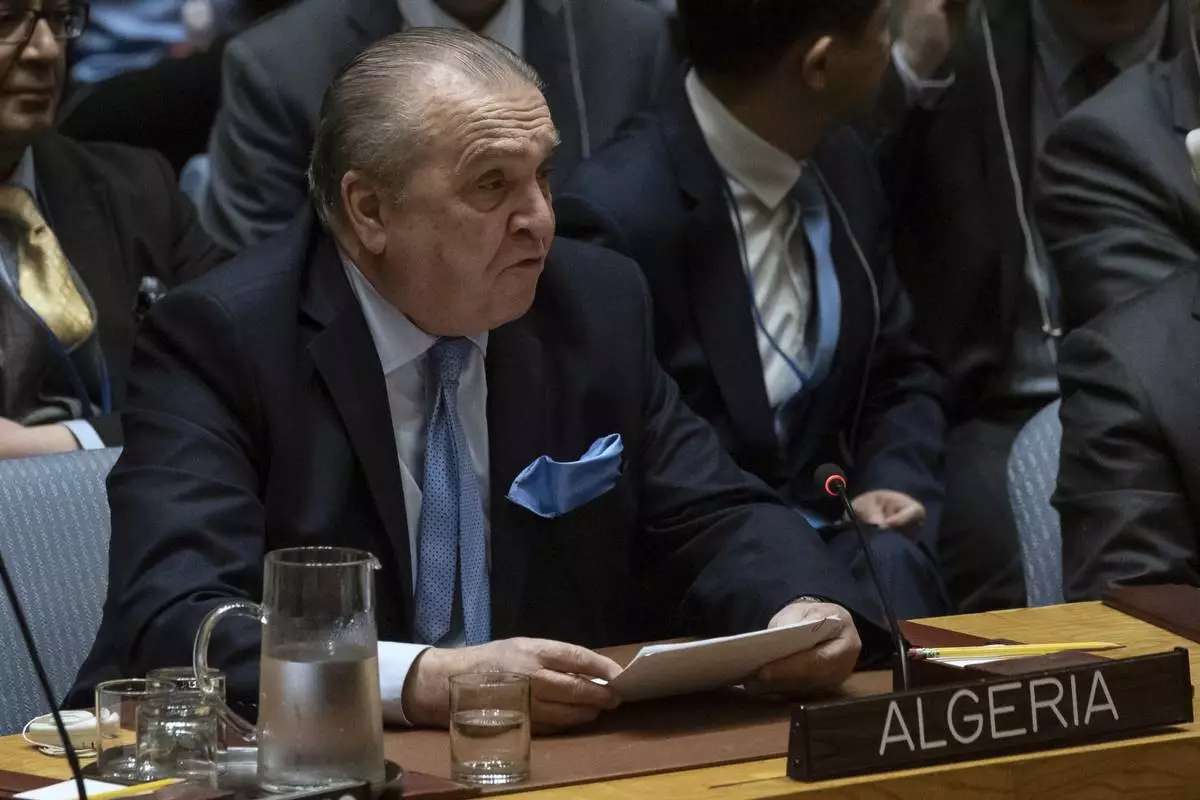
Algeria's Permanent Ambassador to the United Nations Amar Bendjama speaks during a Security Council meeting at United Nations headquarters, Thursday, April 18, 2024. (AP Photo/Yuki Iwamura)
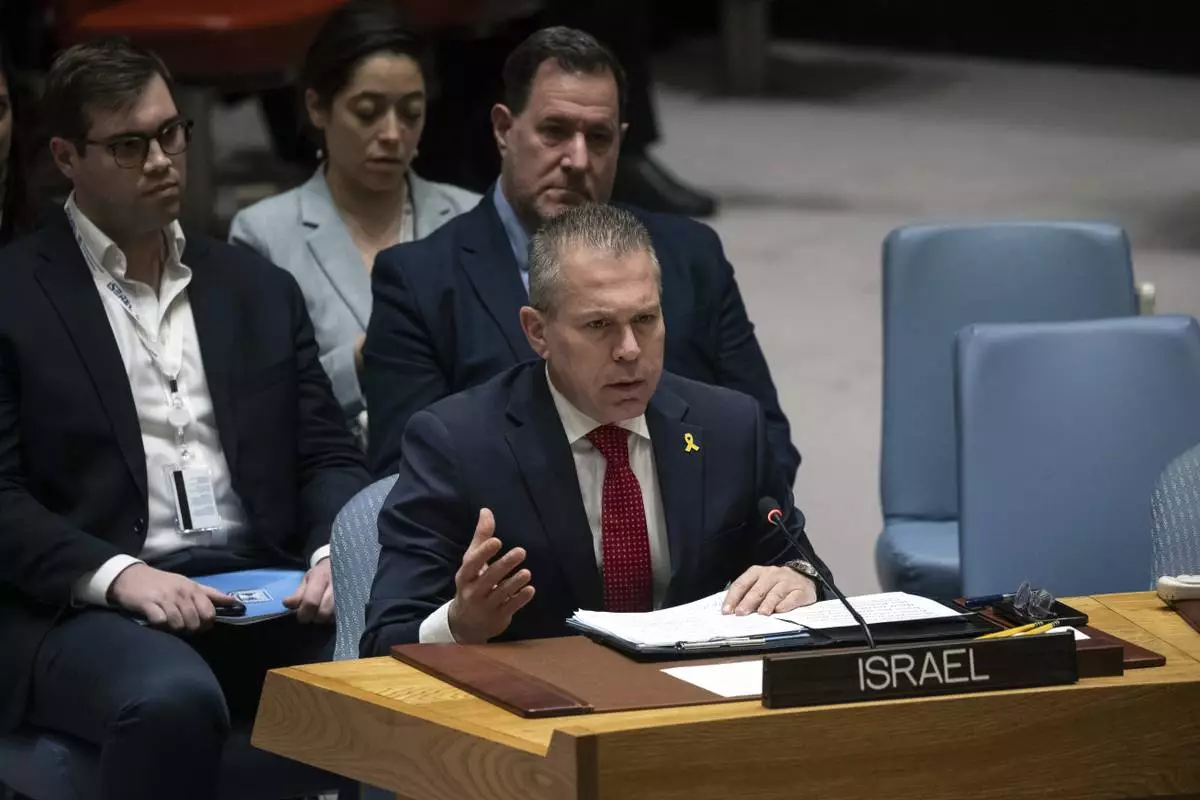
Israeli Ambassador to the United Nations Gilad Erdan speaks during a Security Council meeting at United Nations headquarters, Thursday, April 18, 2024. (AP Photo/Yuki Iwamura)
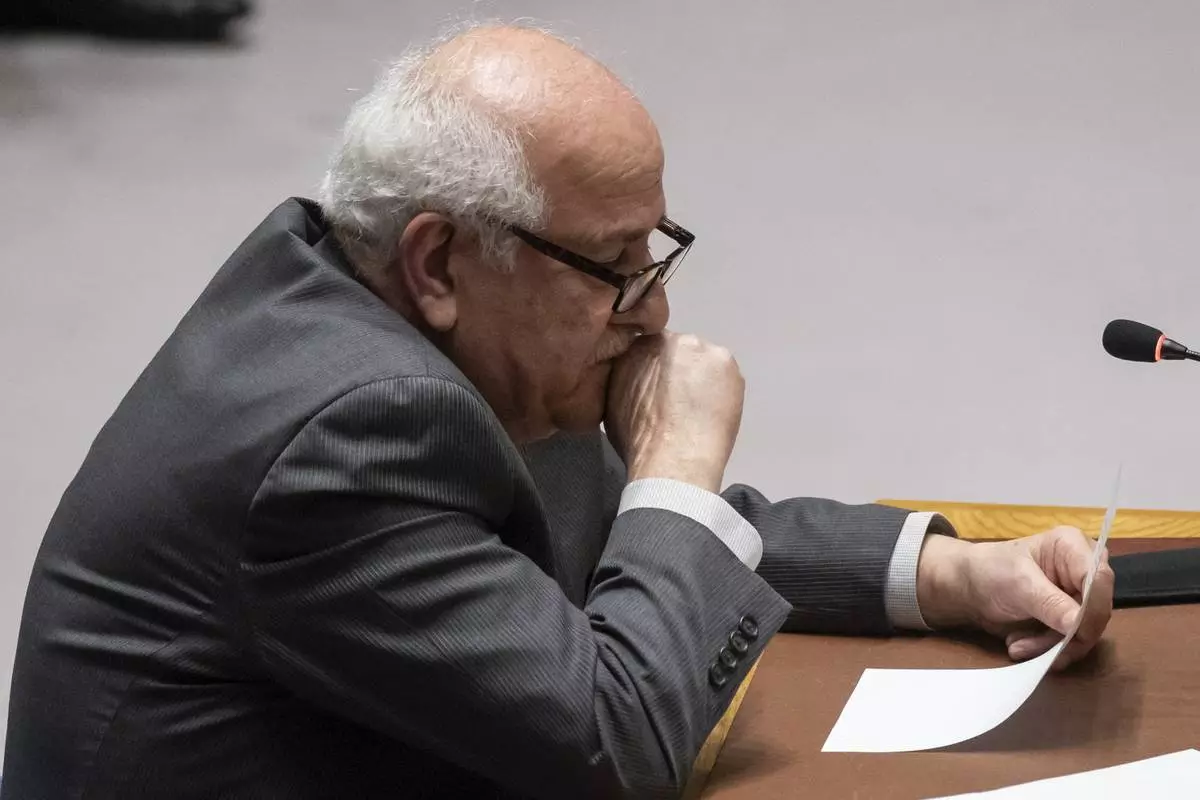
Palestinian Ambassador to the United Nations Riyad Mansour holds tears while speaking during a Security Council meeting at United Nations headquarters, Thursday, April 18, 2024. (AP Photo/Yuki Iwamura)
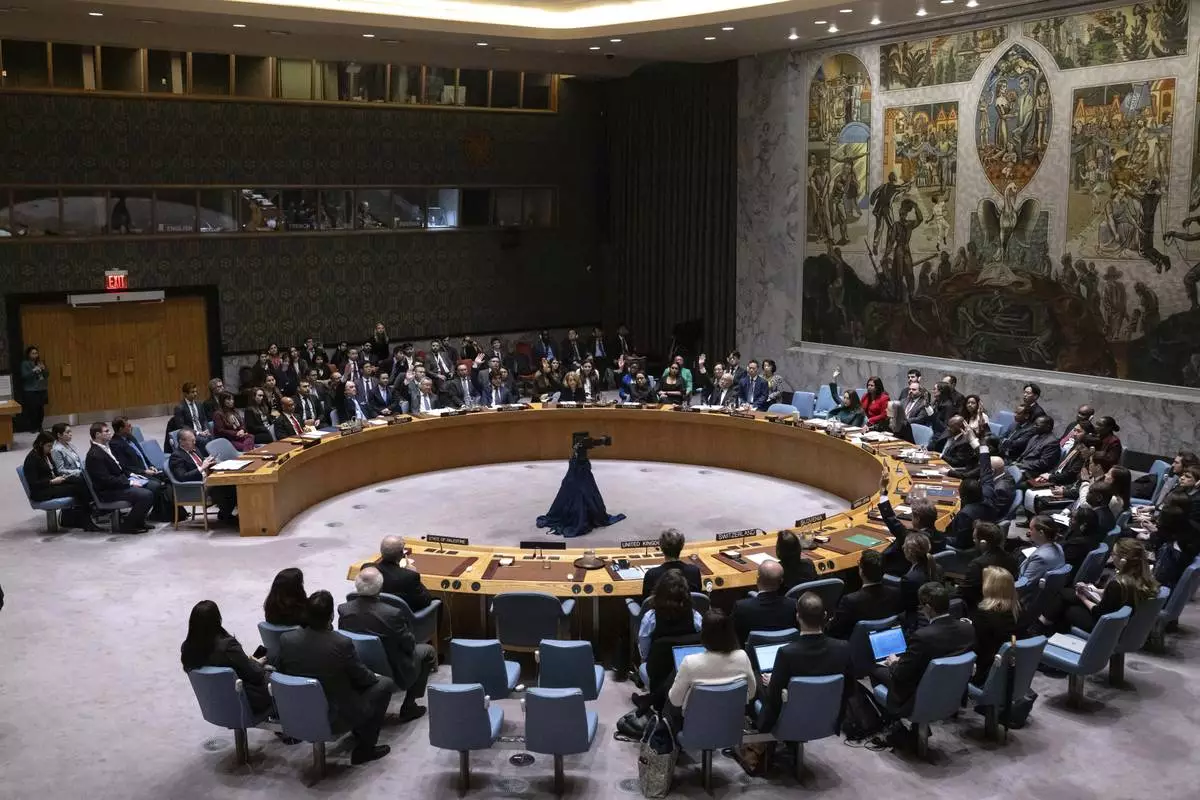
Representatives of member countries take votes during a Security Council meeting at United Nations headquarters, Thursday, April 18, 2024. (AP Photo/Yuki Iwamura)
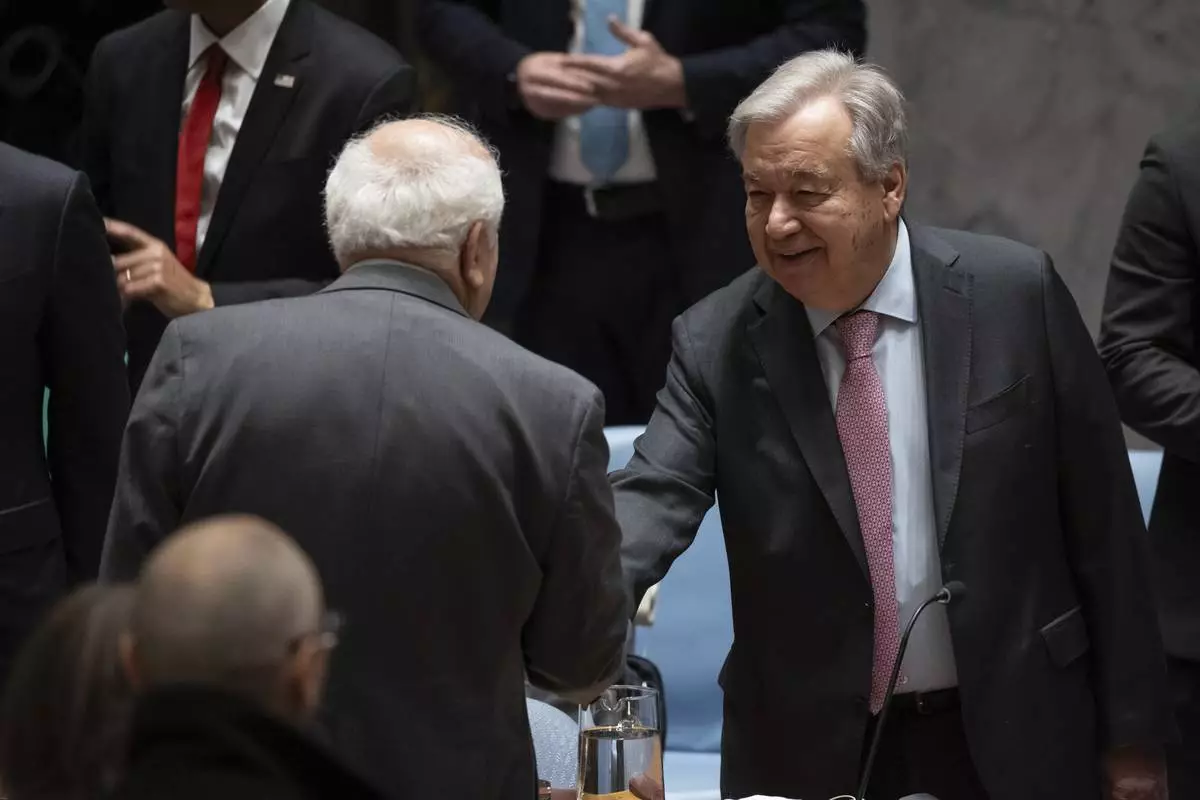
Palestinian Ambassador to the United Nations Riyad Mansour, left, and United Nations Secretary-General Antonio Guterres speak before a Security Council meeting at the United Nations headquarters, Thursday, April 18, 2024. (AP Photo/Yuki Iwamura)
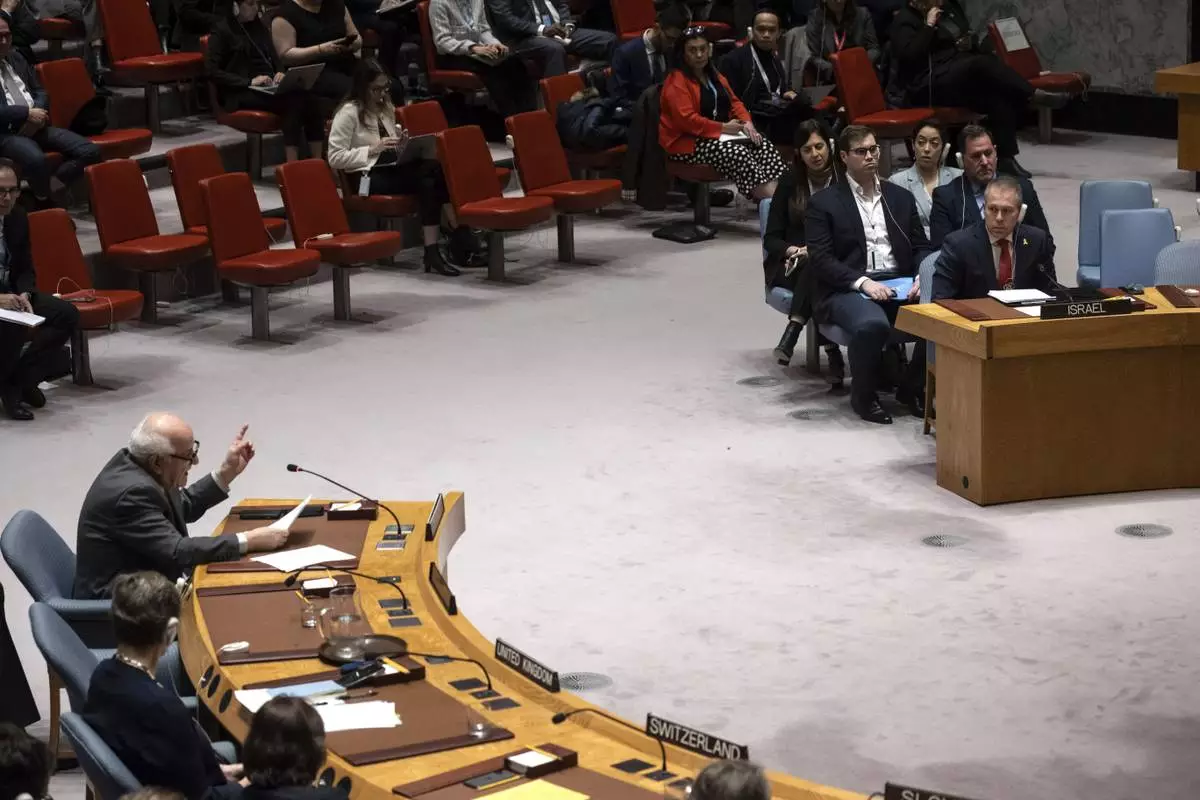
Palestinian Ambassador to the United Nations Riyad Mansour speaks during a Security Council meeting at United Nations headquarters, Thursday, April 18, 2024. (AP Photo/Yuki Iwamura)
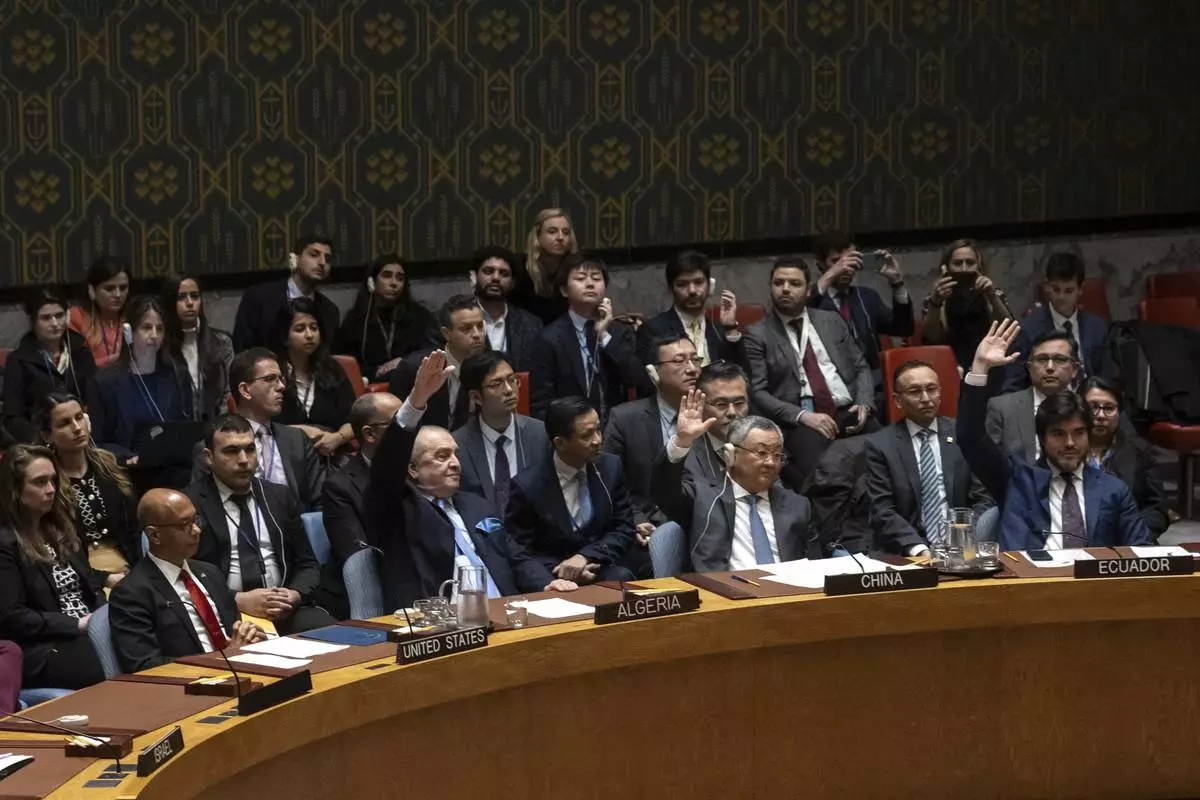
Representatives of member countries take votes during a Security Council meeting at United Nations headquarters, Thursday, April 18, 2024. (AP Photo/Yuki Iwamura)
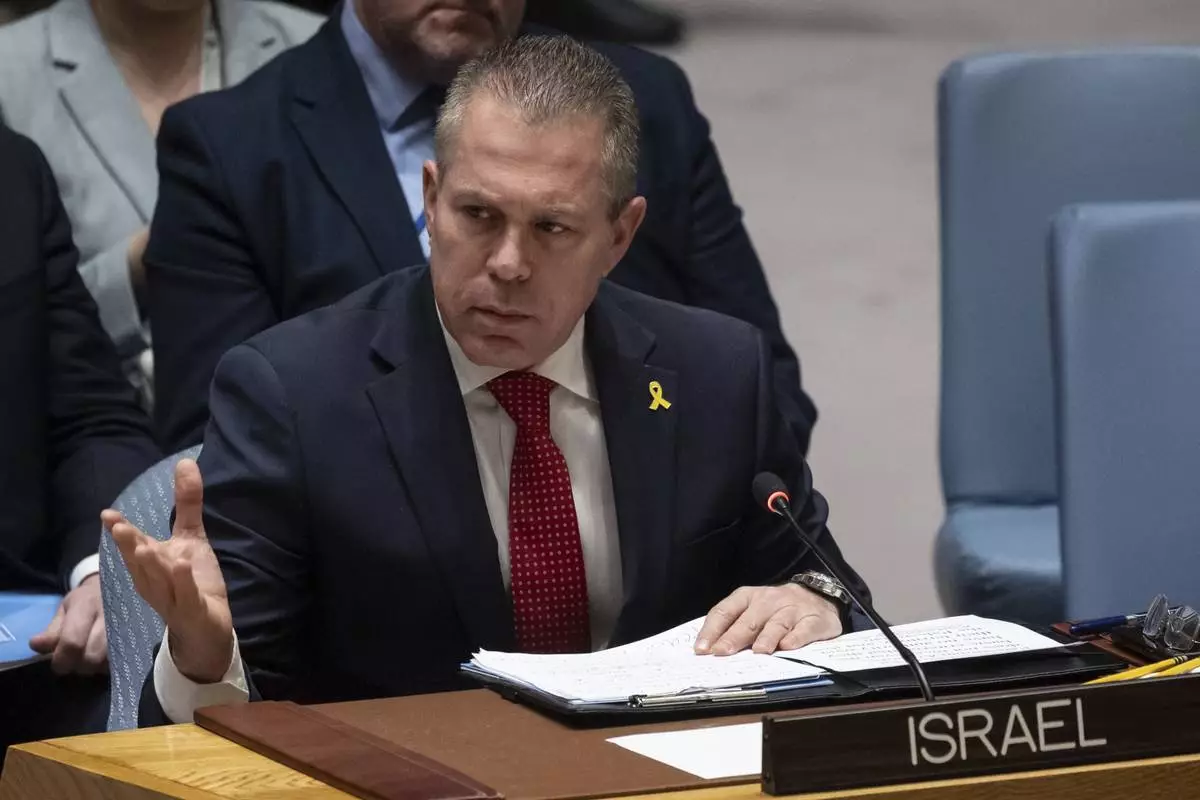
Israeli Ambassador to the United Nations Gilad Erdan speaks during a Security Council meeting at United Nations headquarters, Thursday, April 18, 2024. (AP Photo/Yuki Iwamura)
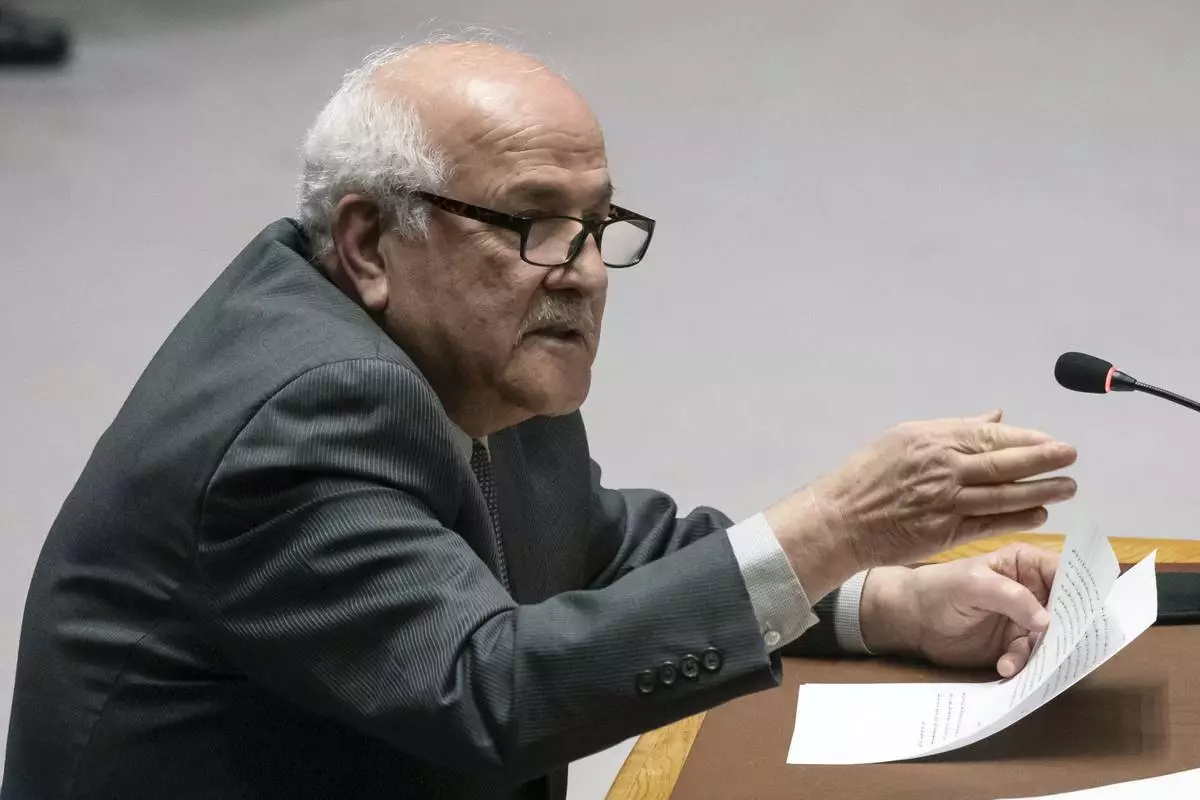
Palestinian Ambassador to the United Nations Riyad Mansour speaks during a Security Council meeting at United Nations headquarters, Thursday, April 18, 2024. (AP Photo/Yuki Iwamura)
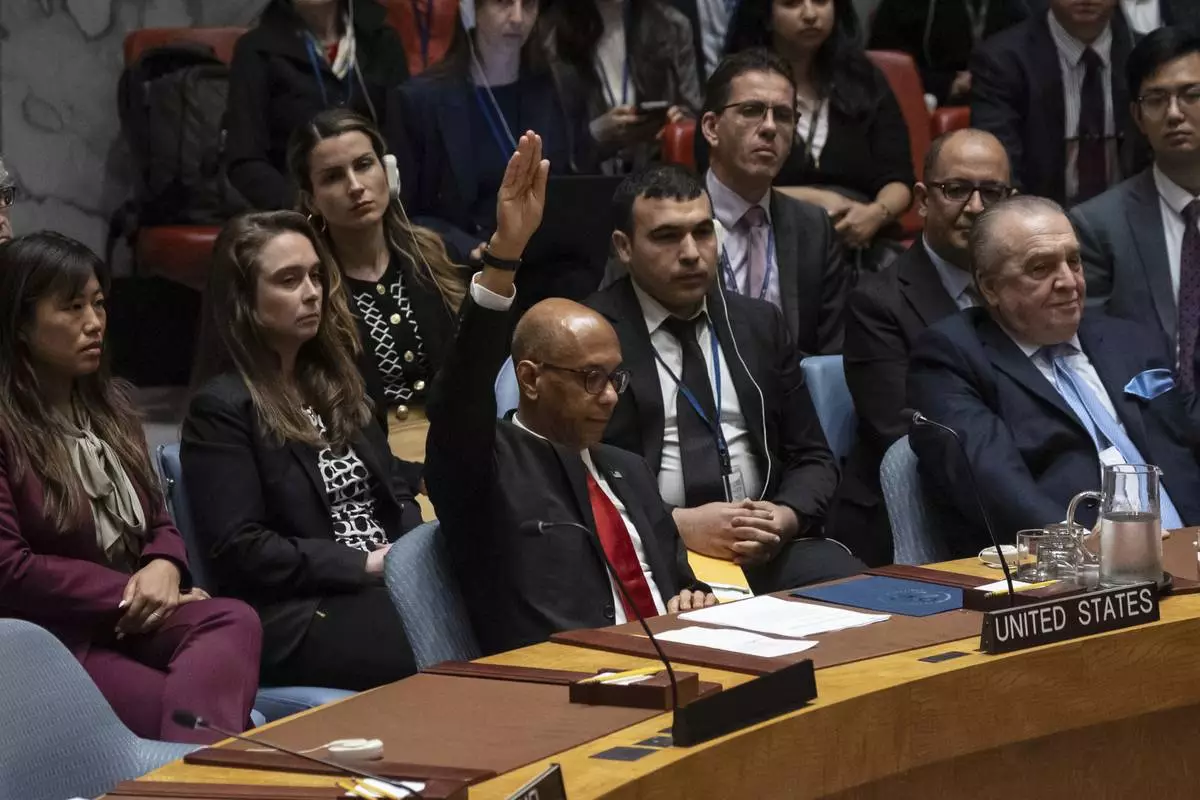
U.S. Deputy Ambassador Robert Wood votes against resolution during a Security Council meeting at United Nations headquarters, Thursday, April 18, 2024. (AP Photo/Yuki Iwamura)



















